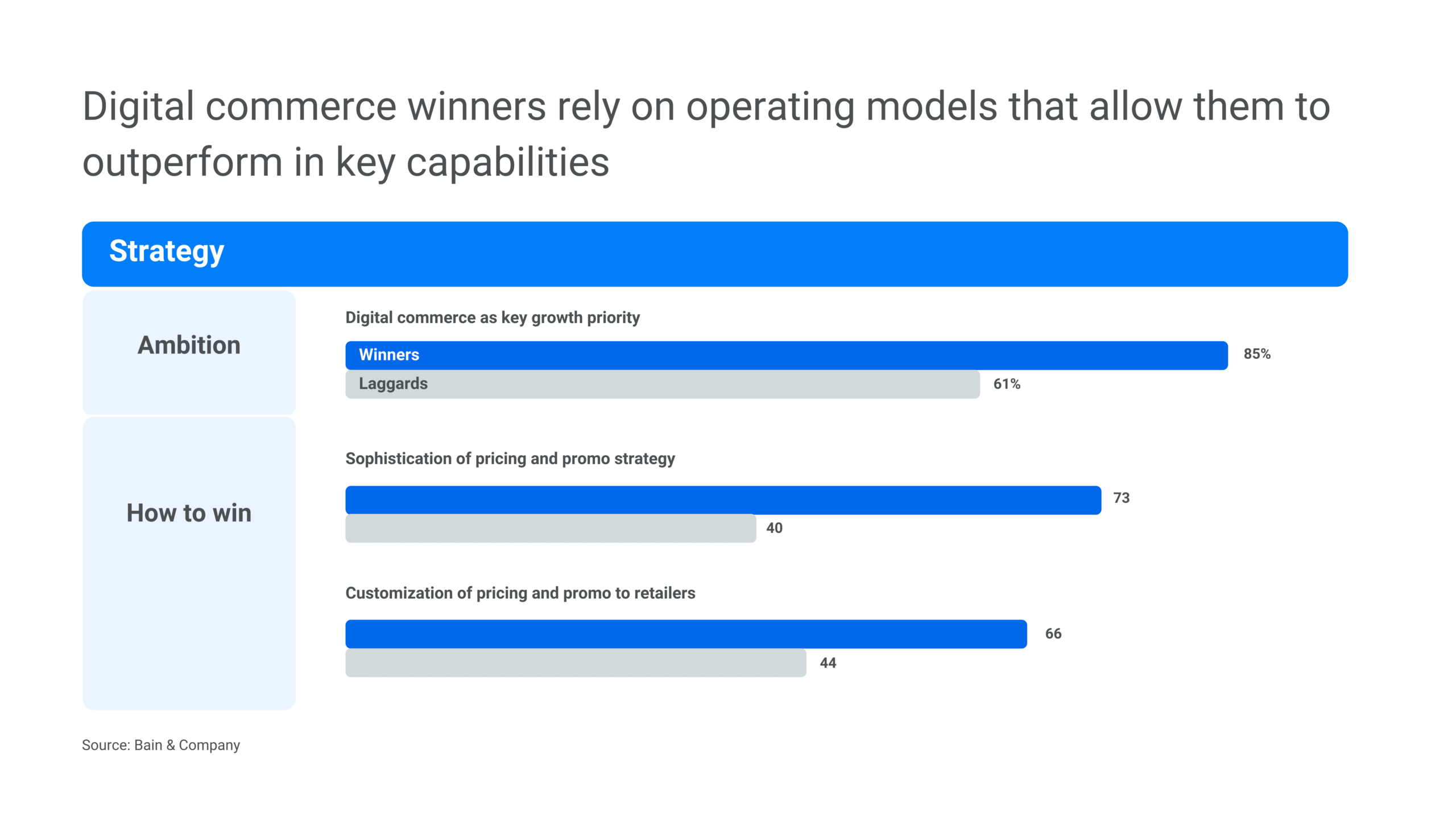Digital transformation and the center of acceleration at CPGs
Digital transformation or a new operating model?
CPGs have varying levels of digital maturity, yet for virtually all of them, simply embedding digital processes into existing structures is insufficient. The business model itself needs to be changed to respond to the market needs of the omnichannel.

Digital commerce is incompatible with organizational silos, so manufacturers need to acquire a digital mindset, master the technologies, and permeate digital ways of working throughout the organization. This requires C-level engagement, company-wide education, and a dedicated ecommerce team to usher in the transformation.
A dedicated omnichannel team
The most common and most effective transformational method according to the companies surveyed by McKinsey is to establish an autonomous ecommerce team to spearhead the shift to digitization. This team should be composed of people who are curious and flexible. Ecomm continues to evolve rapidly, so the people responsible for it need to be open and agile. Talent in this field is still scarce and hiring externally from digital agencies is common.
This team needs to move quickly to be effective. For this reason they need to be independent and have their own P&L and KPIs.
Their ability to test & learn can be used as a way to draw in and motivate the larger organization with their ‘experiments’.
One reason the ecomm team needs such flexibility is that, unlike brick & mortar, ecommerce activity varies per retailer– according to their capabilities and strategies. It varies by region too.
“Successful transformations created, on average, 66% more value, improved corporate capabilities by 82%, and met 120% more of their targets on time.”
Center of acceleration / center of excellence
Local, regional and global teams of digital-savvy personnel can report to a more senior team, the CoA, also known as a CoE. At this point, individual business units can take ownership of their own, fully integrated ecomm channel and the CoA/E can handle projects that are easy to scale like education and new digital capabilities, centralizing tools and playbooks. By keeping major responsibilities within the business units, sales and marketing will be empowered.
Digitization challenges
The truth is, digital transformations are difficult to execute. As mentioned, CPGs are large, matrix-style organizations and implementing systemic changes that affect several business units can be laborious.
A common deterrent to executing digital transformation rapidly and reaping the benefits of “becoming digital” can be an organization’s lack of data management capabilities, so working with a strong data analytics partner is very useful.
“70% of digital transformations fall short of their objectives.”
McKinsey has identified four common mistakes CPGs make when attempting to transform digital and analytics capabilities:
- Neglecting to connect digital and analytics programs to the enterprise strategy
- Making big investments prematurely
- Holding out for “perfect” hires
- Underinvesting in change management
The good news is that as CPGs embrace digitization, they won’t need to transform again. Successful transformations equip companies for sustained success as long as digital innovation is ingrained in processes.
Ecommerce agility
Many challenger brands are digital natives and have operating models born out of ecommerce itself. Their smaller structures put decision makers around the same table and choices are made spontaneously, without hierarchical systems and incumbent, time-heavy infrastructures.
Agility is the buzzword used to describe an organization that processes new information quickly, adapts to it and executes on it, all while being ready to receive new information, recalibrate and re-execute again.
Agility is the child of data analysis. To stay competitive, companies need teams empowered to launch live tests quickly at their discretion. Annual planning needs to shift to real time planning, informed by daily sales and marketing performance. Iterative A/B testing is the hallmark of an organization that is agile in ecommerce.
Execution-oriented operating models
According to Bain, succeeding in digital commerce means installing an operating model that addresses three key challenges: ownership, expertise, and agility. This is about being able to deliver the key KPIs manufacturers typically track.

In our next article we’ll look at some common operating models for CPGs.
Don't miss a thing !

